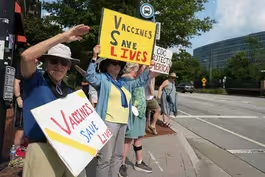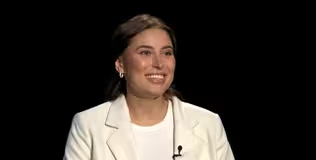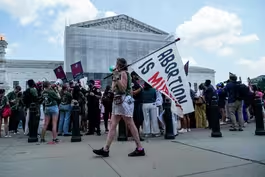
Who gains and who loses under Trump’s big budget bill
Clip: 6/26/2025 | 5m 14sVideo has Closed Captions
Who gains and who loses under Trump’s big budget bill
President Trump’s big budget bill faces a significant test as the Senate prepares to start voting as soon as Friday. It comes as the Senate parliamentarian ruled that some major Medicaid changes in the bill do not qualify for the budget process Republicans are using. Lisa Desjardins reports on where the bill stands and who could gain or lose from it.
Problems playing video? | Closed Captioning Feedback
Problems playing video? | Closed Captioning Feedback
Major corporate funding for the PBS News Hour is provided by BDO, BNSF, Consumer Cellular, American Cruise Lines, and Raymond James. Funding for the PBS NewsHour Weekend is provided by...

Who gains and who loses under Trump’s big budget bill
Clip: 6/26/2025 | 5m 14sVideo has Closed Captions
President Trump’s big budget bill faces a significant test as the Senate prepares to start voting as soon as Friday. It comes as the Senate parliamentarian ruled that some major Medicaid changes in the bill do not qualify for the budget process Republicans are using. Lisa Desjardins reports on where the bill stands and who could gain or lose from it.
Problems playing video? | Closed Captioning Feedback
How to Watch PBS News Hour
PBS News Hour is available to stream on pbs.org and the free PBS App, available on iPhone, Apple TV, Android TV, Android smartphones, Amazon Fire TV, Amazon Fire Tablet, Roku, Samsung Smart TV, and Vizio.
Providing Support for PBS.org
Learn Moreabout PBS online sponsorshipAMNA NAWAZ: We're in a crucial 24 hours for President Trump's big budget bill, as the Senate prepares to start voting as soon as tomorrow.
A key official, the parliamentarian, ruled that some major Medicaid changes in it do not qualify for the budget process Republicans are using.
But President Trump today pushed forward.
At the White House, he brought together Americans whose stories highlight what Republicans like in the bill, including farmers, autoworkers, and employees who rely on tips.
Lisa Desjardins joins us now from the super screen to update us on where the bill stands and who could gain or lose from it.
Lisa, good to see you.
LISA DESJARDINS: Good to see you.
AMNA NAWAZ: So walk us through this decision from the parliamentarian.
What was that about?
LISA DESJARDINS: Right.
The parliamentarian has to decide, does each provision in the bill meet Senate rules for so-called budget reconciliation, which is how this bill is moving?
And she made some very significant rulings about the Medicaid portion in particular.
So let's break down what's in and what's out of the bill on Medicaid.
This happened just in the last 24 hours.
Cuts to state provider taxes, this is a major method of funding for many states.
The parliamentarian ruled that that does not meet the requirements for the bill.
The penalty for states, which use their own money to cover undocumented immigrant in the bill right now, but the parliamentarian ruled, no, that's more policy than it is actually budget maneuver.
There's a ban on transgender care in Medicaid in this bill in the House version and Senate version.
She ruled that cannot stay in the bill.
But some major Medicaid provisions did stay in.
This is new work requirements pass muster, and also checking eligibility every six months so everyone on Medicaid would have to do this.
These are significant reforms.
They would also, according to the Congressional Budget Office, mean millions of people would fall off of Medicaid.
AMNA NAWAZ: So, Lisa, I know you have been taking a closer look at how this bill actually impacts Americans, specifically based on their income.
What can you tell us?
LISA DESJARDINS: I'm so eager to talk about this.
It's such a major bill.
And to look at how the bill affects Americans, you really have to understand its basic structure.
So let's start right there.
First of all, as a lot of folks know, the biggest dollars in this bill, the largest amount are in tax cuts.
These largely actually keep tax rates the same, but, without this bill, taxes would go up, the individual rates, for most Americans.
However, also historic amounts of cuts in this bill, particularly to health care, the circle represents that proportion, that's where most of the cuts are.
So whether you benefit or lose depends on whether you gain more from the tax cuts than you lose from the health care cuts.
We found some data, again, from the Congressional Budget Office that breaks down by income level whether you gain or lose.
So let's take a look at that really quickly.
First, on the tax cuts, you can see most Americans generally gain from these tax cuts, but the bottom 10 percent, look at this, technically lose $40 on average.
These are folks who really may not pay much in taxes, but they're losing some deductions here.
Now, add in the deduct -- the health care changes and the cuts, you see something dramatic.
The bottom 30 percent of Americans on net lose under this bill, according to CBO, mainly because they may be losing their health insurance altogether.
They're losing benefits far more than they are gaining in taxes.
Who gains?
It goes up by income.
And that top 10 percent gain the most.
What's this mean percentage wise?
Well, I have got those numbers too.
This is about a 2 percent gain for the top 10 percent of Americans.
It's about a minus-4 percent loss for those who are the most poor in this country.
AMNA NAWAZ: So, Lisa, it's striking to see the numbers laid out like that.
We already know that there's an existing wealth gap in this country.
What does the bill mean for that?
LISA DESJARDINS: Right.
We can do layers here at "News Hour," and that's an important one.
How much wealth does each group control?
So we wanted to look at this visually in a little different way to give us a different perspective.
This, again, is Americans.
I wanted to map up the whole group again, top bottom 10 percent here, top 10 percent there.
We added sort of a color coding map.
So, again, you see what's happening here is the bottom 10 percent losing the most on net and the top 10 percent gaining the most.
For Americans in the middle, you can see here it's neutral.
Mainly, they don't really gain or lose on net in this bill.
But we wanted to get at this layer where not every group in this map controls the same amount of wealth.
So what we did is, we took this and we made groups larger or smaller based on how much wealth they control.
So a larger group controls more wealth.
I want you to watch that top 10 percent.
Look at this.
What happens?
They control in America right now the top 10 percent, according to the Tax Foundation, 50 percent of the wealth, a little bit more, about 50 percent.
Here, you see four, one, two, three, four rows, 40 percent in the middle, that's about 37 percent of the wealth.
But now look at these five rows here, each one representing 10 percent of America.
That's 50 percent of our country right there.
They control how much?
Ten percent of the wealth.
Why does this matter?
This group right here, the top 10 percent, paying the most in taxes for sure, but they're gaining the most in this bill.
This group that has the least power, the least wealth in this country, losing the most.
Essentially, the conclusion here from the CBO data, Amna, is that the wealth gap would increase under this bill.
AMNA NAWAZ: Lisa Desjardins, incredibly clarifying look at what this bill means for Americans.
Thank you.
LISA DESJARDINS: You're welcome.
Analyzing Iran nuclear damage with former arms inspector
Video has Closed Captions
Clip: 6/26/2025 | 7m 31s | Iran's nuclear program ruined for now, deal needed to keep it that way, ex-inspector warns (7m 31s)
Ex-surgeon general on vaccine panel overhauled by RFK Jr.
Video has Closed Captions
Clip: 6/26/2025 | 7m 9s | Trump's former surgeon general raises concerns about vaccine panel overhauled by RFK Jr. (7m 9s)
Ksenia Karelina describes life after release from Russia
Video has Closed Captions
Clip: 6/26/2025 | 9m 43s | Ksenia Karelina says release from Russian prison 'feels like starting a new life' (9m 43s)
News Wrap: At least 18 killed in Gaza strike, hospital says
Video has Closed Captions
Clip: 6/26/2025 | 3m 39s | News Wrap: At least 18 killed as they waited for flour, Gaza hospital officials say (3m 39s)
Remembering acclaimed public TV journalist Bill Moyers
Video has Closed Captions
Clip: 6/26/2025 | 5m 56s | Remembering acclaimed public TV journalist Bill Moyers (5m 56s)
Sen. Rounds says Iran nuclear threat 'seriously eliminated'
Video has Closed Captions
Clip: 6/26/2025 | 6m 45s | GOP Sen. Rounds says Iran nuclear threat 'very seriously eliminated' (6m 45s)
Supreme Court ruling allows states to deny Medicaid funds
Video has Closed Captions
Clip: 6/26/2025 | 6m | Supreme Court clears way for states to deny Medicaid funding for Planned Parenthood (6m)
Providing Support for PBS.org
Learn Moreabout PBS online sponsorshipSupport for PBS provided by:
Major corporate funding for the PBS News Hour is provided by BDO, BNSF, Consumer Cellular, American Cruise Lines, and Raymond James. Funding for the PBS NewsHour Weekend is provided by...


















